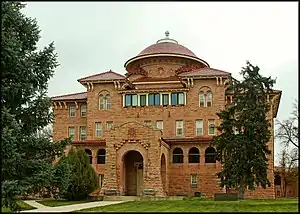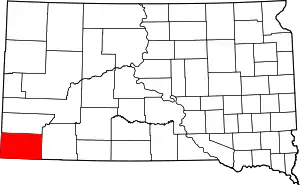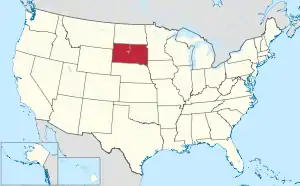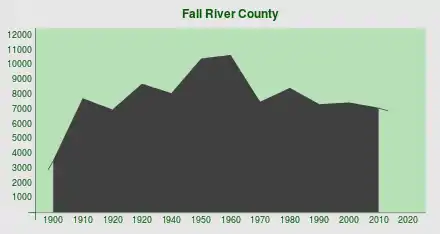Fall River County, South Dakota
Fall River County is a county in the U.S. state of South Dakota. As of the 2020 census, the population was 6,973.[1] Its county seat is Hot Springs.[2] The county was founded in 1883. It is named for Fall River which runs through it.[3]
Fall River County | |
|---|---|
 | |
 Location within the U.S. state of South Dakota | |
 South Dakota's location within the U.S. | |
| Coordinates: 43°15′N 103°31′W | |
| Country | |
| State | |
| Founded | April 3, 1883 |
| Named for | Fall River |
| Seat | Hot Springs |
| Largest city | Hot Springs |
| Area | |
| • Total | 1,749 sq mi (4,530 km2) |
| • Land | 1,740 sq mi (4,500 km2) |
| • Water | 9.2 sq mi (24 km2) 0.5% |
| Population (2020) | |
| • Total | 6,973 |
| • Estimate (2022) | 7,370 |
| • Density | 4.0/sq mi (1.5/km2) |
| Time zone | UTC−7 (Mountain) |
| • Summer (DST) | UTC−6 (MDT) |
| Congressional district | At-large |
| Website | fallriver |
Geography
Fall River County lies at South Dakota's SW corner. Its south borderline abuts the north borderline of the state of Nebraska, and its west borderline abuts the east borderline of the state of Wyoming. The Fall River County terrain contains a mountainous area in the north-central portion, with rolling hills in the rest of the county. Outside the mountainous area, the county's highest point is its SW corner, at 3,970 ft (1,210 m) ASL. Of the several peaks in the mountainous area, one in the NE portion of that zone rises to 4,646 ft (1,416 m) ASL. The terrain slopes to the north and east. Discharging from the Angostura Reservoir, the Cheyenne River flows northeasterly through the upper part of the county, departing the county through its north boundary line into Custer County.
Fall River County has a total area of 1,749 square miles (4,530 km2), of which 1,740 square miles (4,500 km2) is land and 9.2 square miles (24 km2) (0.5%) is water.[4]
Adjacent counties
- Custer County - north
- Oglala Lakota County - east
- Dawes County, Nebraska - southeast
- Sioux County, Nebraska - south
- Niobrara County, Wyoming - west
Protected areas
- Angostura Reservoir State Game Production Area
- Angostura State Recreation Area
- Bailey State Lakeside Use Area
- Battle Mountain State Game Production Area
- Black Hills National Forest (partial)
- Buffalo Gap National Grassland (partial)
- Friendshuh State Game Production Area (partial)
- Hill Ranch State Game Production Area
- Oral State Game Production Area
- Romey State Game Production Area
- Scherbarth State Game Production Area
- Sheps Canyon State Lakeside Use Area
- Sheps Canyon State Recreation Area
- Williams Dam State Game Production
Lakes
- Angostura Reservoir
- Coldbrook Lake
- Cottonwood Springs Lake
Demographics
| Census | Pop. | Note | %± |
|---|---|---|---|
| 1890 | 4,478 | — | |
| 1900 | 3,541 | −20.9% | |
| 1910 | 7,763 | 119.2% | |
| 1920 | 6,985 | −10.0% | |
| 1930 | 8,741 | 25.1% | |
| 1940 | 8,089 | −7.5% | |
| 1950 | 10,439 | 29.1% | |
| 1960 | 10,688 | 2.4% | |
| 1970 | 7,505 | −29.8% | |
| 1980 | 8,439 | 12.4% | |
| 1990 | 7,353 | −12.9% | |
| 2000 | 7,453 | 1.4% | |
| 2010 | 7,094 | −4.8% | |
| 2020 | 6,973 | −1.7% | |
| 2022 (est.) | 7,370 | [5] | 5.7% |
| U.S. Decennial Census[6] 1790-1960[7] 1900-1990[8] 1990-2000[9] 2010-2020[1] | |||

2020 census
As of the census of 2020, there were 6,973 people.
2010 census
As of the census of 2010, there were 7,094 people, 3,272 households, and 1,899 families in the county. The population density was 4.1 inhabitants per square mile (1.6/km2). There were 4,191 housing units at an average density of 2.4 units per square mile (0.93 units/km2). The racial makeup of the county was 88.6% white, 7.1% American Indian, 0.7% black or African American, 0.4% Asian, 0.3% from other races, and 2.9% from two or more races. Those of Hispanic or Latino origin made up 2.2% of the population. In terms of ancestry, 39.7% were German, 12.6% were Irish, 11.2% were English, 8.4% were Norwegian, 5.9% were Dutch, and 2.3% were American.
Of the 3,272 households, 20.4% had children under the age of 18 living with them, 46.2% were married couples living together, 8.9% had a female householder with no husband present, 42.0% were non-families, and 37.6% of all households were made up of individuals. The average household size was 2.10 and the average family size was 2.74. The median age was 50.5 years.
The median income for a household in the county was $35,833 and the median income for a family was $53,750. Males had a median income of $36,495 versus $32,058 for females. The per capita income for the county was $21,574. About 11.4% of families and 17.4% of the population were below the poverty line, including 11.3% of those under age 18 and 21.3% of those age 65 or over.
Communities
Cities
Town
Other communities
Unorganized territories
- Northeast Fall River
- Southwest Fall River
Politics
Fall River voters have been reliably Republican for decades. In no national election since 1936 has the county selected the Democratic Party candidate.
| Year | Republican | Democratic | Third party | |||
|---|---|---|---|---|---|---|
| No. | % | No. | % | No. | % | |
| 2020 | 2,878 | 71.20% | 1,053 | 26.05% | 111 | 2.75% |
| 2016 | 2,511 | 70.47% | 821 | 23.04% | 231 | 6.48% |
| 2012 | 2,258 | 64.22% | 1,140 | 32.42% | 118 | 3.36% |
| 2008 | 2,348 | 61.64% | 1,338 | 35.13% | 123 | 3.23% |
| 2004 | 2,413 | 62.76% | 1,326 | 34.49% | 106 | 2.76% |
| 2000 | 2,185 | 63.72% | 1,133 | 33.04% | 111 | 3.24% |
| 1996 | 1,636 | 47.31% | 1,357 | 39.24% | 465 | 13.45% |
| 1992 | 1,533 | 40.84% | 1,416 | 37.72% | 805 | 21.44% |
| 1988 | 2,002 | 58.59% | 1,380 | 40.39% | 35 | 1.02% |
| 1984 | 2,748 | 70.37% | 1,135 | 29.07% | 22 | 0.56% |
| 1980 | 2,831 | 69.61% | 982 | 24.15% | 254 | 6.25% |
| 1976 | 2,046 | 56.60% | 1,537 | 42.52% | 32 | 0.89% |
| 1972 | 2,374 | 67.89% | 1,107 | 31.66% | 16 | 0.46% |
| 1968 | 1,843 | 59.57% | 965 | 31.19% | 286 | 9.24% |
| 1964 | 2,026 | 54.29% | 1,706 | 45.71% | 0 | 0.00% |
| 1960 | 2,492 | 63.60% | 1,426 | 36.40% | 0 | 0.00% |
| 1956 | 2,377 | 67.39% | 1,150 | 32.61% | 0 | 0.00% |
| 1952 | 2,863 | 73.96% | 1,008 | 26.04% | 0 | 0.00% |
| 1948 | 2,037 | 59.72% | 1,348 | 39.52% | 26 | 0.76% |
| 1944 | 1,938 | 63.33% | 1,122 | 36.67% | 0 | 0.00% |
| 1940 | 2,420 | 63.27% | 1,405 | 36.73% | 0 | 0.00% |
| 1936 | 1,876 | 47.11% | 1,927 | 48.39% | 179 | 4.50% |
| 1932 | 1,351 | 33.53% | 2,603 | 64.61% | 75 | 1.86% |
| 1928 | 2,216 | 63.51% | 1,258 | 36.06% | 15 | 0.43% |
| 1924 | 1,392 | 52.13% | 342 | 12.81% | 936 | 35.06% |
| 1920 | 1,236 | 61.01% | 680 | 33.56% | 110 | 5.43% |
| 1916 | 668 | 40.63% | 922 | 56.08% | 54 | 3.28% |
| 1912 | 0 | 0.00% | 712 | 42.16% | 977 | 57.84% |
| 1908 | 726 | 57.62% | 466 | 36.98% | 68 | 5.40% |
| 1904 | 777 | 71.22% | 248 | 22.73% | 66 | 6.05% |
| 1900 | 521 | 54.96% | 421 | 44.41% | 6 | 0.63% |
| 1896 | 530 | 48.67% | 555 | 50.96% | 4 | 0.37% |
| 1892 | 569 | 53.73% | 262 | 24.74% | 228 | 21.53% |
See also
References
- "State & County QuickFacts". United States Census Bureau. Retrieved August 5, 2023.
- "Find a County". National Association of Counties. Archived from the original on May 31, 2011. Retrieved June 7, 2011.
- Gannett, Henry (1905). The Origin of Certain Place Names in the United States. Govt. Print. Off. p. 123.
- "2010 Census Gazetteer Files". United States Census Bureau. August 22, 2012. Retrieved March 24, 2015.
- "Annual Estimates of the Resident Population for Counties: April 1, 2020 to July 1, 2022". Retrieved April 2, 2023.
- "U.S. Decennial Census". United States Census Bureau. Retrieved March 24, 2015.
- "Historical Census Browser". University of Virginia Library. Retrieved March 24, 2015.
- Forstall, Richard L., ed. (March 27, 1995). "Population of Counties by Decennial Census: 1900 to 1990". United States Census Bureau. Retrieved March 24, 2015.
- "Census 2000 PHC-T-4. Ranking Tables for Counties: 1990 and 2000" (PDF). United States Census Bureau. April 2, 2001. Archived (PDF) from the original on October 9, 2022. Retrieved March 24, 2015.
- Cascade Springs Google Maps (accessed February 2, 2019)
- Leip, David. "Atlas of US Presidential Elections". uselectionatlas.org. Retrieved April 15, 2018.